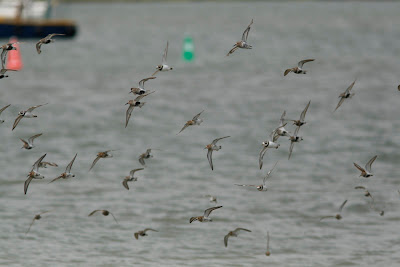 Adult Turnstone- the only other Arenaria in the world is Black Turnstone which a nearctic west coast speciality.
Adult Turnstone- the only other Arenaria in the world is Black Turnstone which a nearctic west coast speciality.
Juvenile Little Tern (above and below) Canvey is well known gathering area for autumn Little Terns. Over the weekend numbers doubled from 30 on the 16th to over 60 on the 17th. Also nearby there were reported arrivals of groups of Black Tern and Curlew Sandpiper at Tilbury. At Canvey we also noticed an arrival of Grey Plover and Knot.

 Little Terns
Little Terns
Oystercatchers- predominately adults showing varying degrees of wing moult. Always on the look out for an American Oystercatcher in the flocks of 500-1000 roosting at Canvey. Oystercatchers (Haematopodidae) are cosmopolitan (marginal in Africa and Asia) but absent from polar regions. There is one genus in the family, 11 species (Canarian Black Oystercatcher extinct) and 16 taxa (HBW).
 Little and Common Terns
Little and Common Terns Ringed Plovers, Common Tern and Dunlin. Interesting to see the variation in wing moult in some of these birds.
Ringed Plovers, Common Tern and Dunlin. Interesting to see the variation in wing moult in some of these birds. Ringed Plover, Little Tern and Dunlin. Mixed tern and wader flocks are quite characteristic of Canvey. Canvey is one of many Thames Estuary roosting sites which include:
Ringed Plover, Little Tern and Dunlin. Mixed tern and wader flocks are quite characteristic of Canvey. Canvey is one of many Thames Estuary roosting sites which include:(from Essex side, west to east and then Kent side east to west) Rainham, Lower and Upper Horse Island (Holehaven). Fobbing (minor site), Vange (inland freshwater site- good for Black-tailed Godwits and tringa sp), Two-tree Island, Canvey Point, Thorpe Bay Beach (winter for Sanderling and calidris), Foulness Island, Shellness, Sheerness and Elmley RSPB (Isle of Sheppey), Oare Marshes, Allhallows-on Sea and Cliffe Pools.
Feeding sites include (from Essex side, west to east and then Kent side east to west): East Tilbury/Mucking Flats, Holehaven Creek, Leigh Sands and Tewkes Creek (Canvey roost), Shoeburyness North Beach and Maplim Sands, The Swale, The Medway complex, Higham Creek (Cliffe)
 Dunlin and Ringed Plover. Always tricky assigning both Dunlin and Ringed Plover to race so I usually don't even try. This time last year Simon and I found a White-rumped Sandpiper at this site. The Thames has a long history of vagrants including, on the Essex side: Western Sandpiper, Baird's Sandpiper, Solitary Sandpiper, Sociable Plover, Collared Pratincole, Black-winged Stilt, Greater-sand Plover, Broad-billed Sandpiper, White-rumps, Marsh Sandpiper, Cream-coloured Courser. The Kent side, including the Swale and Sheppey have an even more impressive list of vagrants.
Dunlin and Ringed Plover. Always tricky assigning both Dunlin and Ringed Plover to race so I usually don't even try. This time last year Simon and I found a White-rumped Sandpiper at this site. The Thames has a long history of vagrants including, on the Essex side: Western Sandpiper, Baird's Sandpiper, Solitary Sandpiper, Sociable Plover, Collared Pratincole, Black-winged Stilt, Greater-sand Plover, Broad-billed Sandpiper, White-rumps, Marsh Sandpiper, Cream-coloured Courser. The Kent side, including the Swale and Sheppey have an even more impressive list of vagrants. Little Tern- a Canvey classic. Flag-ringed birds recorded at this site reveal that some of these birds originate from Belgium.
Little Tern- a Canvey classic. Flag-ringed birds recorded at this site reveal that some of these birds originate from Belgium.
16th August
 Dunlin and Ringed Plover. Always tricky assigning both Dunlin and Ringed Plover to race so I usually don't even try. This time last year Simon and I found a White-rumped Sandpiper at this site. The Thames has a long history of vagrants including, on the Essex side: Western Sandpiper, Baird's Sandpiper, Solitary Sandpiper, Sociable Plover, Collared Pratincole, Black-winged Stilt, Greater-sand Plover, Broad-billed Sandpiper, White-rumps, Marsh Sandpiper, Cream-coloured Courser. The Kent side, including the Swale and Sheppey have an even more impressive list of vagrants.
Dunlin and Ringed Plover. Always tricky assigning both Dunlin and Ringed Plover to race so I usually don't even try. This time last year Simon and I found a White-rumped Sandpiper at this site. The Thames has a long history of vagrants including, on the Essex side: Western Sandpiper, Baird's Sandpiper, Solitary Sandpiper, Sociable Plover, Collared Pratincole, Black-winged Stilt, Greater-sand Plover, Broad-billed Sandpiper, White-rumps, Marsh Sandpiper, Cream-coloured Courser. The Kent side, including the Swale and Sheppey have an even more impressive list of vagrants. Little Tern- a Canvey classic. Flag-ringed birds recorded at this site reveal that some of these birds originate from Belgium.
Little Tern- a Canvey classic. Flag-ringed birds recorded at this site reveal that some of these birds originate from Belgium.16th August
Canvey Point
1 adult Curlew Sandpiper, 1 adult Brent Goose, 30+ Little Tern, 15 Common Tern, 20 Sandwich Tern, 350+ Ringed Plover, 260 Dunlin, 1 Whimbrel, 6 Knot, 2 Bar-tailed Godwit, 200+ Black-tailed Godwit (over), 3 Shoveler,1 Yellow Wagtail, 1 Swallow
Vange
Vange
2 Wood Sandpiper, 40 Black-tailed Godwit, 1 Green Sandpiper, 1 Common Sandpiper, 8 Snipe, 5 Pochard,
17th August
17th August
Canvey Point
1 male Peregrine, 1 adult Sanderling, 1 Golden Plover, 60+ Little Tern, 10 Common Tern, 10 Sandwich Tern, 45+ Knot, 50+ Grey Plover, 250+ Ringed Plover, 200+ Dunlin, 2 Bar-tailed Godwit, 200+ Black-tailed Godwit (over), 1 adult Brent Goose, 1 Yellow Wagtail

No comments:
Post a Comment